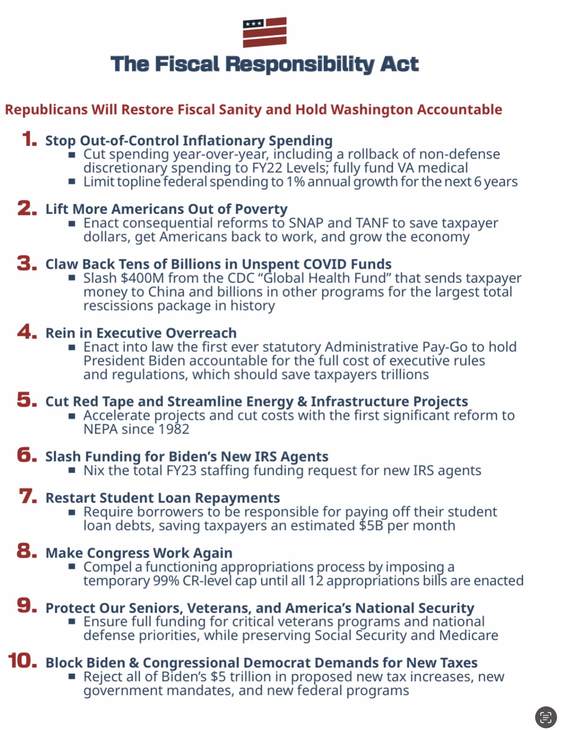Speaker Kevin McCarthy was able to cobble together enough Republican votes to push through a bill suspending the $34.1 trillion—TRILLION—debt ceiling. The Fiscal Responsibility Act passed Wednesday night with a 314-117 vote. The bill essentially removes the federal government’s borrowing limit until January 1, 2025—after the next presidential election.
BREAKING: The Biden/Kevin McCarthy debt ceiling deal passes with more Democrat votes than Republicans. pic.twitter.com/TmqBHuwLrO
— Greg Price (@greg_price11) June 1, 2023
One hundred forty-nine Republicans joined Democrats in voting to raise the debt ceiling, enough for McCarthy to drag the bill across the finish line. The speaker said it would “restore fiscal sanity and hold Washington accountable” by doing the following:

McCarthy claims the vote is a big win, noting that Joe Biden and Sen. Chuck Schumer (D-N.Y.) had demanded a clean debt limit, but Republicans refused to allow it.
President Biden and Senator Schumer demanded a “clean debt limit,” which really means more taxes and more spending. But that’s not what the American people wanted, or our Founders envisioned, or what Republicans were going to allow. https://t.co/FZoKUvnvnO
— Kevin McCarthy (@SpeakerMcCarthy) June 1, 2023
McCarthy called it “the biggest spending cut in American history.”:
Here’s the bottom line: the Fiscal Responsibility Act is the biggest spending cut in American history. https://t.co/wJb6laevSA
— Kevin McCarthy (@SpeakerMcCarthy) May 31, 2023
The Congressional Budget Office on Tuesday said the legislation would result in $1.5 trillion in savings over a decade.
President Biden also celebrated passage of the bill in the Republican-controlled House. “This agreement is good news for the American people and the American economy,” he said after the vote. “I urge the Senate to pass it as quickly as possible so that I can sign it into law.”
Rep. Chip Roy (R-Texas) was one of the most vocal members objecting to the bill:
“This deal isn't going to reduce spending, even though everybody's going around saying it will.”
“And we all know the big winner will be government, not the American people.”-Rep. Roy pic.twitter.com/2YOinF9p4l
— Rep. Chip Roy Press Office (@RepChipRoy) May 31, 2023
“The American people know, the government is 40% BIGGER than it was pre-COVID."
"Let’s go back to pre-COVID levels of spending. That’s what we asked for… This deal doesn’t do that.” -Rep. Royhttps://t.co/IeOMKUXhtx
— Rep. Chip Roy Press Office (@RepChipRoy) May 31, 2023
Roy voted no on the bill, along with 71 other Republicans:
Here are the 71 Republicans who voted AGAINST the AWFUL Debt Ceiling bill:
-Alford
-Biggs
-Bishop (NC)
-Boebert
-Bost
-Brecheen
-Buchanan
-Buck
-Burchett
-Burlison
-Cammack
-Carter (TX)
-Cline
-Cloud
-Clyde
-Collins
-Crane
-DesJarlais
-Donalds
-Fallon
-Finstad
-Fischbach
-Fry…— Joey Mannarino (@JoeyMannarinoUS) June 1, 2023
Rep. Nancy Mace (R-S.C.), who voted no, said, “The vast majority of Americans wanted to see spending cuts in exchange for increasing the debt ceiling. And that’s not what happened tonight. And so I’m disappointed in the outcome of the vote. I think we could have done better.”
Rep. Byron Donalds (R-Fla.) blasted the bill ahead of his no vote, tweeting, “Let’s be clear at the end of the day this bill only cuts $12B but allows $4T in new debt. It also sets in place spending caps at post-COVID levels. This doesn’t reflect the priorities or best interests of the American people.”
Rep. Lauren Boebert (R-Colo.) said the bill gave too much money to the IRS:
Just so we’re all working off the same sheet of music, the IRS gets a 1.75% budget cut in this debt ceiling bill.
Best case scenario, instead of 87,000 new agents for the IRS Army we get about 1,500 less.
That’s not repealing 87,000 IRS agents.
— Lauren Boebert (@laurenboebert) May 31, 2023
The House Freedom Caucus called it a “win for Joe Biden.”
More Democrats (165) voted for the Biden-McCarthy debt limit deal than Republicans (149).
Tells you everything you need to know…
This is a win for Joe Biden: An uncapped debt ceiling increase to finance his agenda to Jan 2025 while leaving every one of his policies intact.
— House Freedom Caucus (@freedomcaucus) June 1, 2023
Meanwhile, in the upper chamber, Sen. Bernie Sanders (S-Vt.) warned that he will not vote for the bill as it stands:
I cannot, in good conscience, vote for the debt ceiling deal. pic.twitter.com/Y5M8kP8AEo
— Bernie Sanders (@SenSanders) May 31, 2023
Rep. Justin Amash, a Libertarian member of Congress, explained that it’s wrong to compare raising the debt ceiling to paying your credit card bill.
“As it’s commonly (and incorrectly) presented, raising the debt ceiling is like paying your credit card bill,” he said. “You bought something on credit, enjoyed it, and the bill is due. The only question is whether you will now pay. But that’s not at all what happens. In reality, raising the debt ceiling is like increasing your credit limit so you can borrow more. You’re out of money but want to keep buying things—and you owe interest on existing borrowing. The additional debt mostly finances new purchases. You never pay your credit card bill, because you never pay down the debt.”
Perhaps nothing has been more detrimental to a general understanding of the debt ceiling than the misstated version of the credit card analogy.
As it’s commonly (and incorrectly) presented, raising the debt ceiling is like paying your credit card bill. You bought something on…
— Justin Amash (@justinamash) May 31, 2023
The bill now heads to the Senate, where Schumer has said he will not allow any Republican amendments. The federal government will run out of money to pay its bills on Monday unless the bill passes in the Senate and is signed by Biden.










Join the conversation as a VIP Member